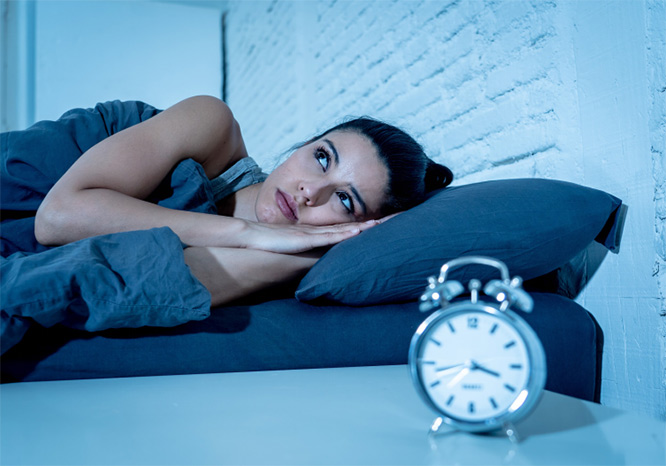 by Charles Wood
by Charles Wood
If you’ve ever found yourself tossing and turning in the early hours of the morning for no apparent reason, then you’ll completely understand the frustration this brings, especially if it happens regularly.
You’re also not alone — in fact, one-third of Britons now sleep for just five to six hours per night, which is less than the standard six-to-nine hours we’re advised to aim for.
As getting a good night’s sleep is the key to feeling and looking our best, it’s important to determine if there are any significant factors that are affecting your slumber. Why are you wide awake and what can you do to return to a restful night’s sleep?
There’s more than one possible reason, but in today’s world, the cause is likely to be a combination of factors — some of which you’ve probably never considered. Let’s take a look.
Get Comfortable
A comfortable bed is vital to enjoying a good night’s sleep; yet being uncomfortable tops a Sleep Council poll when participants were asked why they struggle with shuteye. It’s recommended that we replace our beds every seven years, but if your mattress is fairly new and is still giving you aches and pain, consider using a pressure relief mattress topper instead.
This a helpful bedding item, but often overlooked — you’ll be surprised at the different problems it can address. A mattress topper helps to distribute pressure effectively and provides comfort all night long.
Ease Anxiety
There’s a close relationship between sleep and mental health, as each can affect the other and it can create a vicious circle. If anxiety is causing thoughts to race through your mind and making it difficult to sleep, there are a few things you can try to quieten the noise.
Prepare your body and brain for sleep by letting yourself know that it’s time to wind down. This can be done in a physical sense, by having a bath, listening to soothing music or reading a book; or you can focus on relaxing your mind through meditation or doing some breathing exercises. You could even try writing down all of your feelings before you settle down for bed, to release your worries.
And if you’ve heard of the phrase “tidy home, tidy mind”, it’s for good reason. While the immediate benefits of tidying up are obvious, it’s believed that clearing out the clutter from your space can also eliminate the metaphorical clutter of your mind. With anxiety affecting more than 8.2 million people in the UK, it’s definitely a tactic worth trying.
Cut Caffeine and Alcohol
As caffeine is a stimulant, you’re probably using it to wake up in the morning or to remain alert throughout the day. As well as tea and coffee, it’s also in soft drinks and chocolate, and it can all quickly add up.
But there’s no nutritional need for caffeine in your diet, and once in the body, caffeine will remain there for several hours. So to help you sleep better, try to reduce your caffeine intake and avoid consuming any caffeinated drinks after 2pm.
This also goes for alcohol consumption before bed. Although you may fall into a deeper sleep quicker, it isn’t ideal, as you’ll spend less time than usual in the more restful, Rapid Eye Movement (REM) stage of sleep. As a result, this can leave you feeling extra tired the next day.
Hydrate
A lack of fluids plays a critical role in how well you sleep at night, as your body is trying to work hard to repair itself and prepare for the day ahead. Understanding the impact of your daily fluid intake goes a long way towards improving the quality of your sleep because if you’re dehydrated while your body is trying to work, you will feel sluggish and irritable during the day.
Going to bed even mildly dehydrated can disrupt your sleep as it can cause your mouth and nasal passages to become dry, which sets you up for sleep-disruptive snoring and a parched throat and hoarseness in the morning. A lack of water can also lead to leg cramps, which may keep you awake.
In addition to the frustration of fragmented sleep, being dehydrated during the night can also compromise your alertness, energy and cognitive performance the following day. A glass of water before bed will not only replace lost moisture, but it will also help your liver to flush out unhealthy toxins within the body as you sleep.
Reduce Screen Time
Using screens right before bed is one that we’re all guilty of as our phones, computers and other tech gadgets have become such a huge part of our daily lives. While it may not seem significant to have your phone next to you on the nightstand, it’s just too easy to pick up and browse when you feel a pang of restlessness. After spending an entire day surrounded by technology, your mind needs time to unwind.
Also worth bearing in mind is that the blue light emitted by screens restrain the production of melatonin, which is the hormone that controls your sleep/wake cycle or circadian rhythm. As a result, this makes it harder to fall and stay asleep.
To make sure technology isn’t harming your sleep, give yourself at least 30 minutes of screen-free transition time before hitting the hay. Or even better, make your bedroom a technology-free zone by keeping your electronics outside the room.
Provided that you are willing to have a go at changing these lifestyle habits, you’ll quickly learn which ones have a positive effect on your quality of sleep, so you’ll be back to enjoying a restful sleep once again.
Author Bio
Charles Wood is the director of Airospring. Whether you need Lumbar support or a breathable surface to sleep on, Airospring has products to make your life more comfortable.
